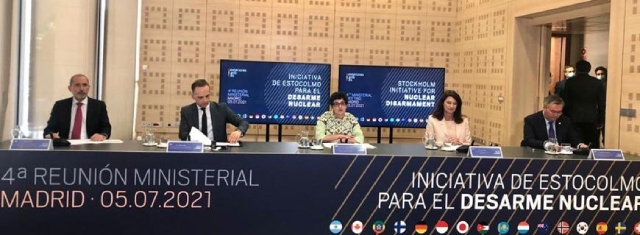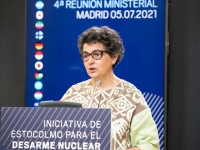Politics
Spain, Germany and Sweden call for greater commitments to nuclear disarmament
Stockholm Initiative Meeting

(Source: Pool)
USPA NEWS -
Spain, Germany and Sweden have formed a common front in defense of nuclear disarmament, which has been paralyzed for years and which the three countries want to promote. Representatives from sixteen countries met in Madrid on Monday to analyze the current state of the nuclear disarmament and non-proliferation process. The ministers defined their priorities to strengthen the Non-Proliferation Treaty and advance in the reduction of nuclear arsenals.
The Stockholm Initiative, established in 2019, aims to strengthen the Non-Proliferation Treaty (NPT), promote nuclear disarmament and achieve a world free of nuclear weapons. Last year in Berlin, the Initiative presented 22 concrete proposals ("Stepping Stones") to revitalize and promote nuclear disarmament efforts.
The Ministers of the Stockholm Initiative renewed their call on all nuclear-weapon States to show leadership, address and reduce nuclear risks, and promote nuclear disarmament by taking meaningful steps to fulfill their commitments under the NPT. They also expressed their satisfaction with the extension in February of the New START and the planned resumption of the dialogue on strategic stability between the United States and Russia. They also welcomed the reaffirmation of both presidents that a nuclear war cannot be won and should never be fought. The ministers also noted that these three measures correspond to proposals made by the Stockholm Initiative and called for additional measures.
After reviewing the current state of the global disarmament efforts, the Stockholm Initiative ministers focused on their contributions to the upcoming NPT Review Conference, reiterating their full support for the Conference President-Designate, Ambassador Gustavo Zlauvinen. The ministers took stock of the work carried out since the Ministerial Meeting in Amman in January, and expressed their satisfaction with the adoption of a new working document of the Stockholm Initiative on nuclear risk reduction, promoted by Switzerland. They also took note of the growing number of alignments among NPT States Parties with the "Stepping Stones for Moving Toward Nuclear Disarmament," and called for greater synergies within the NPT community.
Ministers discussed several specific issues related to the NPT, including but not limited to support for the Comprehensive Nuclear Test Ban Treaty (TPCEN), the start of negotiations for the Fissile Materials Cessation Treaty (FMCT). and verification of nuclear disarmament; the establishment of a Zone Free of Nuclear Weapons, other Weapons of Mass Destruction and their delivery systems in the Middle East, in accordance with the 1995 Resolution and the 2010 NPT Review Conference; the entry into force of the Treaty for the Prohibition of Nuclear Weapons; and its commitment to regional proliferation challenges, including prospects for preserving and strengthening the Joint Comprehensive Plan of Action on Iran (JCPOA).
Finally, the ministers adopted a new roadmap for the coming months. They agreed to strengthen rapprochement and dialogue with other States parties to the NPT, groups and initiatives in the field of nuclear disarmament; maintain high-level contacts with the nuclear-weapon States; and make a new effort to gather the views of young people and civil society. The ministers agreed to meet again before the NPT Review Conference to continue their common effort for a world free of nuclear weapons.
Liability for this article lies with the author, who also holds the copyright. Editorial content from USPA may be quoted on other websites as long as the quote comprises no more than 5% of the entire text, is marked as such and the source is named (via hyperlink).






